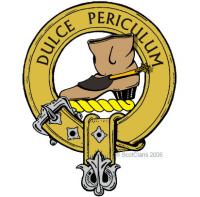
Clan MacAulay
The name MacAulay grew from two unconnected areas. One came from Dunbartonshire and were the MacAulays of Ardincaple. The other was the MacAulays of Lewis. The MacAulays of Ardincaple may have came to be through Amhlaidh, who was the son of Alwin, Earl of Lennox in the early thirteenth century.
The name Aulay MacAulay, or Amhlaidh Mac Amhlaidh appears in the Ragman Roll which was written in 1296. When the Roll of the Landlords and Bailies in the Highlands and Isles was compiled in 1587 Sir Aulay MacAulay appears here as one of the principal vassals of the Earl of Lennox. There are, however, historians who believe that despite the MacAulays' long association with the Earls of Lennox, the name actually originated as one of the branches of the Siol Alpin.
This would tie the inception of the MacAulays to the same family from which came the MacGregors. Whether or not they were related the two families had many ties down through their histories.
In 1591 a bond of manrent was agreed between MacGregors of Glen Strae and the Laird of Ardincaple. This involved MacAulay’s recognition of MacGregor superiority with a payment of cattle to him.
The MacGregors were always involved in feuds and the MacAulays were often called upon to lend support. When eventually the MacGregors were declared outlaws and suffered the terrible consequences that came with this, the MacAulays were spared punishment as their associates thanks to the protection of the Earls of Lennox. This was the early 1600s and by 1767 the fortunes of the family had declined so much that the castle and lands of Ardincaple had to be sold for debt to Campbell of Argyll.
In the Outer Hebrides lived the MacAulays of Lewis. The name here simply meant ‘son of Olaf’, the ancient King, and the earliest written reference to a MacAulay of Lewis was about Donald Camm in 1610. The name meant Donald One-eye and this man was famous for his great strength. Donald’s son died at the Battle of Aldearn in 1645 fighting for Charles I.
Future MacAulays invariably became Calvinist ministers.








